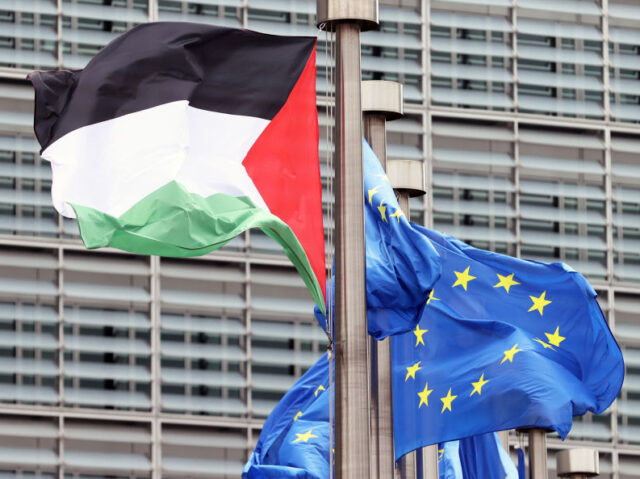The European Union, which is the single biggest global donor to Palestine, has walked back its statement on Monday that it was suspending all payments after the Hamas terrorist attack, revealing deep division inside Brussels and between member states on how to respond.
Brussels was quick to respond to the enormous Islamist terrorist attack against Israel by Hamas, with commissioner Olivér Várhelyi announcing it would be “immediately” suspending all payments to Palestine and placing its projects under review, including a “comprehensive assessment of the whole portfolio”. Yet just hours later the statement announcing the freeze by the Hungarian national Commissioner responsible for the bloc’s relationships with its neighbours appeared to have been slapped down from above, and the aid taps turned back on.
The internal struggle over whether to keep funding Palestine in the wake of the attack on Israel or not was played out in full view in those hours, with the Union first cancelling out the original statement by saying there was no need to suspend payments because none were due to be made, before later saying there are payments “due” and they would go ahead. The bloc has said instead it would try to “ensure that no EU funding indirectly enables any terrorist organization to carry out attacks against Israel”.
WATCH: ‘Allah hu Akbar!’ Pro-Palestine Protesters Rally Outside Israeli Embassy in London, Clash with Policehttps://t.co/Lfn1wMh7rU
— Breitbart London (@BreitbartLondon) October 9, 2023
Explaining the new European position, the chief of the Union’s diplomatic service Josep Borrell claimed suspending payments to Palestine would “embolden terrorists” and damage “EU interests in the region”. A report in London’s Financial Times explains this means Middle Eastern nations “implored” Brussels not to cut aid, arguing “it would undermine potential peace talks and be exploited by Hamas as evidence that the west no longer cares for them.”
In normal times the European Union treats the pronouncements of its commissioners as fact and sticks to them over the concerns of individual member states. But as alluded to in reports, including that of newswire Reuters, the issue reveals cracks in Europe’s approach to Israel. Commissioner for the EU Neighbourhood Olivér Várhelyi has written on social media that “the scale of terror and brutality against Israel and its people is a turning point. There can be no business as usual.”
The Hungarian diplomat announced: “All payments [are] immediately suspended. All projects [are] put under review. All new budget proposals, including for 2023 [are] postponed until further notice.”
“Incitement to hatred, violence and glorification of terror have poisoned the minds of too many,” he added. “We need action and we need it now.”
Yet this position has been cast aside.
Israel Announces ‘Complete Siege’ of Gaza Strip Cutting Off Water, Food, and Electricity, Vows to Destroy Military Capability of Hamashttps://t.co/uqSfHqhj0i
— Breitbart London (@BreitbartLondon) October 9, 2023
The bloc has maintained that its financial assistance does not go to Hamas, claiming that it is directed to Non-Governmental Organisations (NGOs) and other independent actors within the territories after imposing a “no contact policy” with the terrorist group in 2007. However, given that money is fungible, it is wholly possible the aid delivered by the EU could have reduced the spending burden of the Palestinian Authority and Hamas.
The question of whether or not the EU continues to fund Palestine is not a small one: The bloc is currently the largest provider of financial aid to Palestinians in the Gaza Strip and West Bank, with €691 million ($728/£597 million) committed this year to provide education, health, and social services. The EU has committed a total of €1.18 billion in financial aid from 2021 to 2024, according to analysis by the Financial Times.
The announcement and retracement betray the cracks in the Union between the different perspectives on how to respond to Islamic extremist attacks against Israel. The declaration the Union was ending all funding followed similar statements from Germany and Austria, but was contested by nations like Spain, Portugal, and Ireland.
Berlin had previously committed €250 million (around $265 million) in aid to Palestine for 2023 and 2024, with half of the money being provided through the United Nations Relief and Works Agency for Palestine Refugees in the Near East (UNRWA).
On Sunday, Berlin said that humanitarian support payments are “not currently being made” as the government reviews its support packages following the terror attacks on Israel, which have killed over 800 people and injured over 2,500 since Saturday, alone.
German Development Minister Svenja Schulze said: “These attacks on Israel are a terrible turning point… We will therefore examine our entire commitment to the Palestinian territories.”
Meanwhile, Austria has suspended its aid, which amounted to €19 million per year.
Germany Suspends Aid to Palestine as Berlin Launches Review of All Humanitarian Support Paymentshttps://t.co/E0TiCOqmXZ
— Breitbart London (@BreitbartLondon) October 8, 2023

COMMENTS
Please let us know if you're having issues with commenting.